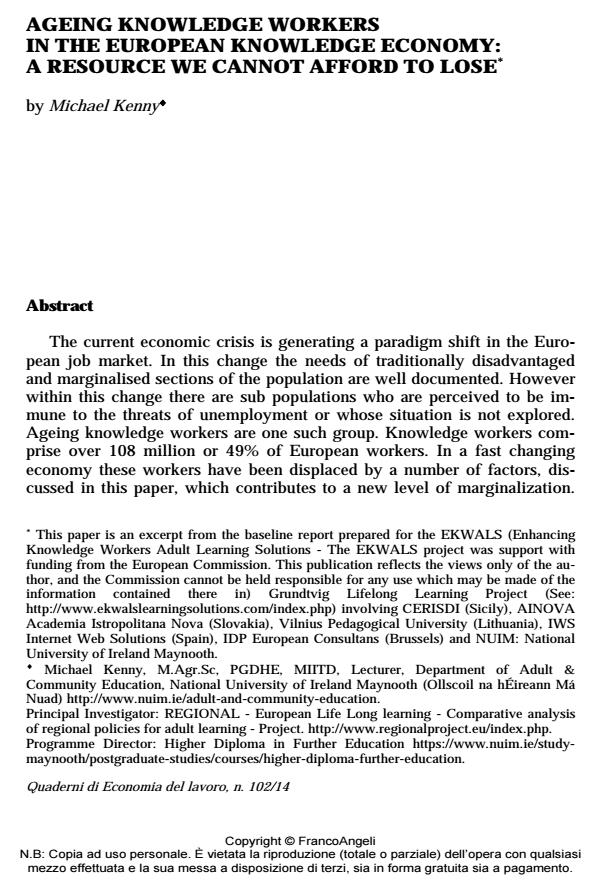Ageing knowledge workers in the european knowledge economy: a resource we cannot afford to lose
Titolo Rivista QUADERNI DI ECONOMIA DEL LAVORO
Autori/Curatori Michael Kenny
Anno di pubblicazione 2015 Fascicolo 2014/102
Lingua Italiano Numero pagine 14 P. 29-42 Dimensione file 71 KB
DOI 10.3280/QUA2014-102003
Il DOI è il codice a barre della proprietà intellettuale: per saperne di più
clicca qui
Qui sotto puoi vedere in anteprima la prima pagina di questo articolo.
Se questo articolo ti interessa, lo puoi acquistare (e scaricare in formato pdf) seguendo le facili indicazioni per acquistare il download credit. Acquista Download Credits per scaricare questo Articolo in formato PDF

FrancoAngeli è membro della Publishers International Linking Association, Inc (PILA), associazione indipendente e non profit per facilitare (attraverso i servizi tecnologici implementati da CrossRef.org) l’accesso degli studiosi ai contenuti digitali nelle pubblicazioni professionali e scientifiche.
The current economic crisis is generating a paradigm shift in the European job market. In this change the needs of traditionally disadvantaged and marginalised sections of the population are well documented. However within this change there are sub populations who are perceived to be immune to the threats of unemployment or whose situation is not explored. Ageing knowledge workers are one such group. Knowledge workers comprise over 108 million or 49% of European workers. In a fast changing economy these workers have been displaced by a number of factors, discussed in this paper, which contributes to a new level of marginalization. Further the skills and knowledge capacity of this population is being lost to the European economy and to active engagement at a more local level. With increasing longevity and pressures on welfare and pension systems the cost of retiring highly skilled knowledge workers while they are still active is being questioned. This paper seeks to map the factors impinging on the decisions that ageing knowledge workers make as they approach life transitions: unemployment, retirement, displacement. This paper suggests that, while further research and dialogue is needed, there is adequate understanding to recognise that the ageing knowledge workers are a resource that the modern world cannot afford, for both social and economic reasons, to lose.
Michael Kenny, Ageing knowledge workers in the european knowledge economy: a resource we cannot afford to lose in "QUADERNI DI ECONOMIA DEL LAVORO" 102/2014, pp 29-42, DOI: 10.3280/QUA2014-102003